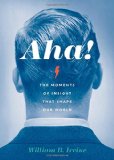December 16, 2014

Aha!: The Moments of Insight that Shape Our World by William B. Irvine (Oxford University Press, 2014)
(kindle ed.), (amazon.co.uk), (UK kindle ed.)
Book description from the publisher:
Great ideas often develop gradually after studying a problem at length–but not always. Sometimes, an insight hits like a bolt from the blue. For Archimedes, clarity struck while he was taking a bath. For Gustav Mahler, it came as the blades of his oars touched the water. And for Albert Einstein, it emerged while he was talking to a friend. Why do these moments of insight strike so suddenly? Why do they so often come to us when we are focused on something completely unrelated? And when great ideas “come to” us, where do they come from?
In Aha!: The Moments of Insight that Shape Our World, philosopher William B. Irvine, author of A Guide to the Good Life and On Desire, explores these epiphanies, from the minor insights that strike us all daily, to the major realizations that alter the course of history. Focusing on aha moments as they take place in five different domains–religion, morality, science, math, and art–Irvine provides case studies that shed light on the different ways epiphanies happen in the different domains, and on their differing social impact. Along the way, he describes some of the great aha moments in history, from ancient times to the present day.
We like to think that our greatest thoughts are the product of our conscious mind. Irvine demonstrates, though, that it is our unconscious mind that is the source of our most significant insights, and that the role the conscious mind plays in eliciting these insights is to try, unsuccessfully, to solve certain problems. Only if the conscious mind is willing to do this–and thereby experience considerable frustration–is the unconscious mind likely to reward it with a breakthrough insight-that the conscious mind will then take credit for.
Google Books preview:
See also: Author’s website
Comments (0)
- new books,psychology
December 15, 2014

Feeling Smart: Why Our Emotions Are More Rational Than We Think by Eyal Winter (PublicAffairs, 2014)
(kindle ed.), (amazon.co.uk), (UK kindle ed.)
Book description from the publisher:
Which is smarter—your head or your gut? It’s a familiar refrain: you’re getting too emotional. Try and think rationally. But is it always good advice?
In this surprising book, Eyal Winter asks a simple question: why do we have emotions? If they lead to such bad decisions, why hasn’t evolution long since made emotions irrelevant? The answer is that, even though they may not behave in a purely logical manner, our emotions frequently lead us to better, safer, more optimal outcomes.
In fact, as Winter discovers, there is often logic in emotion, and emotion in logic. For instance, many mutually beneficial commitments—such as marriage, or being a member of a team—are only possible when underscored by emotion rather than deliberate thought. The difference between pleasurable music and bad noise is mathematically precise; yet it is also something we feel at an instinctive level. And even though people are usually overconfident—how can we all be above average?—we often benefit from our arrogance.
Feeling Smart brings together game theory, evolution, and behavioral science to produce a surprising and very persuasive defense of how we think, even when we don’t.
Comments (0)
- cognitive science,new books,psychology
November 12, 2014

Great Myths of the Brain by Christian Jarrett (Wiley Blackwell, 2014)
(kindle ed.), (amazon.co.uk), (UK kindle ed.)
Book description from the publisher:
Great Myths of the Brain introduces readers to the field of neuroscience by examining popular myths about the human brain. Explores commonly-held myths of the brain through the lens of scientific research, backing up claims with studies and other evidence from the literature Looks at enduring myths such as “Do we only use 10% of our brain?”, “Pregnant women lose their mind”, “Right-brained people are more creative” and many more. Delves into myths relating to specific brain disorders, including epilepsy, autism, dementia, and others Written engagingly and accessibly for students and lay readers alike, providing a unique introduction to the study of the brain Teaches readers how to spot neuro hype and neuro-nonsense claims in the media.
Google Books preview:
See also: Author’s website
Comments (0)
- cognitive science,new books,psychology
October 25, 2014

On Reflection by Hilary Kornblith (Oxford University Press, 2014)
(amazon.co.uk)
Book description from the publisher:
Hilary Kornblith presents a new account of reflection, and its importance for knowledge, reasoning, freedom, and normativity. Philosophers have frequently extolled the value of reflective self-examination, and a wide range of philosophers, who differ on many other things, have argued that reflection can help to solve a number of significant philosophical problems. The importance of reflecting on one’s beliefs and desires has been viewed as the key to solving problems about justification and knowledge; about reasoning; about the nature of freedom; and about the source of normativity. In each case, a problem is identified which reflective self-examination is thought to address.
Kornblith argues that reflection cannot solve any of these problems. There is a common structure to these issues, and the problems which reflection is thought to resolve are ones which could not possibly be solved by reflecting on one’s beliefs and desires. More than this, he suggests that the attempt to solve these problems by appealing to reflection saddles us with a mystical view of the powers of reflective self-examination. Recognition of this fact motivates a search for a demystified view of the nature of reflection.
To this end, Kornblith offers a detailed examination of views about knowledge, reasoning, freedom, and normativity in order to better understand the motivations for extolling self-reflective examination. He explores both the logic of these views, and the psychological commitments they involve. In the final chapter, he offers a more realistic view of reflection, which draws on dual process approaches to cognition.
Google Books preview (hardcover ed.):
See also: Author’s website
Comments (0)
- new books,psychology






